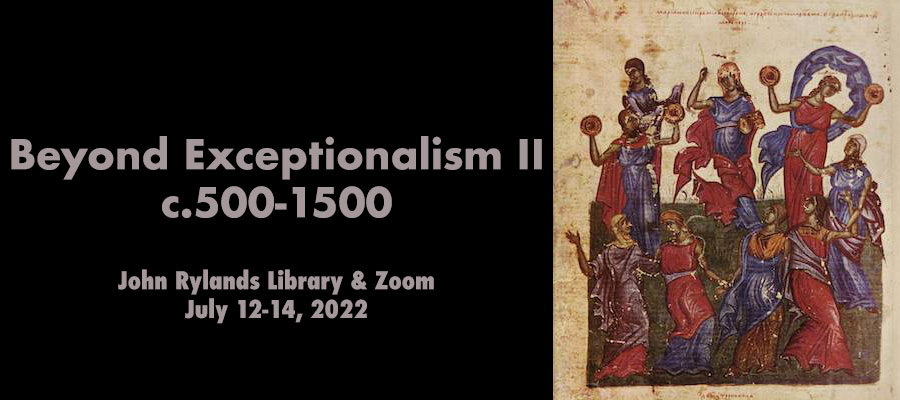Beyond Exceptionalism II, c.500-1500, John Rylands Library & Zoom, July 12-14, 2022
We are delighted to announce the Beyond Exceptionalism II conference which will take place on 12-14 July 2022 at John Rylands Library in Manchester, UK. The conference will adopt a hybrid format that simultaneously offers sessions both in-person and via Zoom.
In 2015, Beyond Exceptionalism I addressed the troubling situation that after over fifty years of intense research and publication, the study of medieval European women had not reversed the entrenched notion that elite woman with the authority and ability to influence their families, communities, and realms were somehow all exceptions to the normal situation of female powerlessness and passivity. The conference centered on a rhetorical question: how many ‘exceptional’ women in positions of authority does it take before active females become the rule? Hosted by Heather Tanner at the Ohio State University, the ‘Beyond Exceptionalism’ conference resulted in new avenues of research, fresh approaches to medieval women’s experiences and an edited volume: Medieval Elite Women and the Exercise of Power, 1100–1400: Moving beyond the Exceptionalist Debate (Palgrave 2018).
Six years and one global pandemic later, the question still resonates. The assumption that medieval women were marginalized remains at the center of medieval studies. Beyond Exceptionalism II will be an interdisciplinary conference that continues to address this misapprehension by fostering new avenues and interpretations of medieval women– elite and non-elite, secular and religious – and exploring new methodologies. We encourage papers that draw upon material culture, network analysis, gender, and space. Presentations that address a non-European perspective are most welcome. Papers that utilize items in the JRL collection are especially welcome. We also welcome submissions from scholars at all levels, from doctoral students to senior scholars.
Possible topics include but are not limited to: lordship, manorialism, monasticism, crusades, literacy, monarchy, guilds, pilgrimage, warfare, towns, castles & manors, networks and alliances, medicine, patronage, lay religious life, law and custom.
